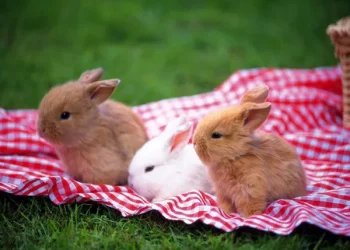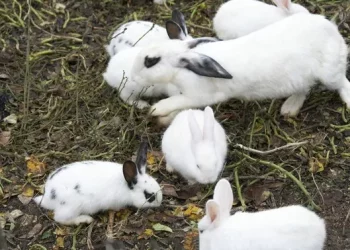Rabbits are beloved pets known for their gentle nature and distinctive dietary needs. Ensuring they receive a balanced diet is crucial for their health and well-being. One common question among rabbit owners is whether fruits like bananas can help rabbits gain weight. This question taps into broader concerns about optimal nutrition and weight management in rabbits. This article delves into the nutritional needs of rabbits, the role of bananas in their diet, and the broader implications for weight management and overall health.
Understanding Rabbit Nutrition
Basics of a Rabbit’s Diet
Rabbits are herbivores with a diet primarily composed of hay, fresh vegetables, and limited amounts of fruit. Their digestive systems are adapted to process high-fiber foods, which are crucial for maintaining gastrointestinal health. The main components of a rabbit’s diet include:
Hay: The staple of a rabbit’s diet, providing essential fiber that promotes healthy digestion and prevents obesity.
Fresh Vegetables: Offer a variety of nutrients and vitamins, including leafy greens like kale, romaine lettuce, and cilantro.
Pellets: Formulated to provide balanced nutrition but should be given in moderation to avoid excessive caloric intake.
Fruits: Offered as treats, fruits are high in sugars and should be given in limited quantities.
Understanding these dietary components is essential for assessing the impact of specific foods, such as bananas, on a rabbit’s weight and health.
Nutritional Needs of Rabbits
Rabbits require a diet high in fiber and low in fat and sugar. Key nutritional needs include:
Fiber: Essential for maintaining healthy digestion and preventing gastrointestinal problems. Fiber helps to keep the gut moving and reduces the risk of obesity.
Protein: Important for growth and repair. While rabbits need protein, it should be balanced with other nutrients.
Vitamins and Minerals: Necessary for overall health, including vitamins A, D, and E, as well as calcium and phosphorus.
A balanced diet ensures that rabbits receive all the nutrients they need without excess calories that can lead to weight gain.
Bananas and Rabbit Health
Nutritional Profile of Bananas
Bananas are a popular fruit known for their high content of potassium, vitamin C, and dietary fiber. However, they also contain significant amounts of sugar and carbohydrates. The nutritional profile of a banana includes:
Calories: Approximately 89 calories per 100 grams.
Sugar: About 12 grams of sugar per 100 grams.
Fiber: Around 2.6 grams per 100 grams.
Potassium: About 358 mg per 100 grams.
Vitamin C: Approximately 8.7 mg per 100 grams.
While bananas are nutritious for humans, their high sugar content makes them a less suitable choice for rabbits, especially when considering their dietary requirements.
Impact of Bananas on Rabbit Health
When considering whether bananas help rabbits gain weight, it is important to examine their impact on rabbit health:
Sugar Content
The high sugar content in bananas can pose risks for rabbits. Excessive sugar intake can lead to obesity, dental issues, and gastrointestinal disturbances. Unlike humans, rabbits have a limited ability to process large amounts of sugar, which can disrupt their digestive system.
Fiber Content
Bananas do provide some dietary fiber, but not in the amounts needed for optimal rabbit health. Rabbits require a high-fiber diet to maintain proper digestion and prevent conditions like gastrointestinal stasis.
Caloric Density
Bananas are relatively calorie-dense compared to the high-fiber, low-calorie foods that rabbits need. Feeding bananas in large quantities could contribute to weight gain but may also lead to an imbalance in their overall diet.
Bananas and Weight Gain in Rabbits
Feeding Bananas to Rabbits
Bananas should only be fed to rabbits in small amounts due to their high sugar content and low fiber. A small slice of banana as an occasional treat is generally safe but should not make up a significant portion of their diet. The focus should be on providing a balanced diet with a high proportion of hay and fresh vegetables.
Alternatives for Weight Management
For rabbits that need to gain weight, focusing on their overall diet and health is more effective than relying on high-sugar fruits like bananas. Strategies for weight gain in rabbits include:
Increasing Hay Intake: Hay is the most important part of a rabbit’s diet and should be available at all times. It provides essential fiber and helps with weight management.
Adding Nutritious Vegetables: Incorporate calorie-dense vegetables like carrots and sweet peppers in moderation to increase caloric intake without excess sugar.
High-Fiber Pellets: Choose pellets that are high in fiber and low in sugars to ensure balanced nutrition.
Monitoring Weight and Health
Regular monitoring of a rabbit’s weight and overall health is crucial. A veterinarian can provide guidance on appropriate dietary adjustments and monitor for any health issues that may arise from dietary changes.
Scientific Research and Evidence
Studies on Rabbit Nutrition
Research on rabbit nutrition highlights the importance of a high-fiber diet and the risks associated with high-sugar foods. Studies have shown that excessive sugar intake can lead to obesity and other health issues in rabbits. While specific research on bananas is limited, general findings on rabbit diet and health support the cautious use of high-sugar fruits.
See Also: What Do Rabbits Need for Beginners?
Comparative Analysis
Comparing bananas with other fruits and vegetables commonly fed to rabbits can provide insights into their suitability. For instance, leafy greens and vegetables have higher fiber content and lower sugar levels, making them more appropriate for a rabbit’s diet.
Ethical Considerations
Responsible Pet Ownership
Responsible pet ownership involves providing a diet that meets the specific needs of rabbits. While bananas can be a tasty treat, they should not replace the essential components of a rabbit’s diet. Ensuring a balanced diet and avoiding excessive sugary treats contribute to the overall health and well-being of pet rabbits.
Education and Awareness
Educating rabbit owners about proper nutrition and the potential risks of feeding inappropriate foods is essential. Awareness programs and resources can help pet owners make informed decisions and prevent dietary-related health issues in rabbits.
Conclusion
In summary, while bananas can be a tempting treat for rabbits, they are not an ideal food for promoting weight gain due to their high sugar content and relatively low fiber levels. Rabbits require a diet high in fiber and low in sugar to maintain optimal health and prevent obesity. Bananas should be offered in moderation, if at all, and should not replace the essential components of a rabbit’s diet.
For rabbits that need to gain weight, focusing on a balanced diet with ample hay, fresh vegetables, and appropriate pellets is more effective. Regular monitoring and consultations with a veterinarian ensure that dietary adjustments support the rabbit’s health and well-being. Understanding the nutritional needs of rabbits and making informed dietary choices are crucial for maintaining their health and happiness.
Related Topics:

























